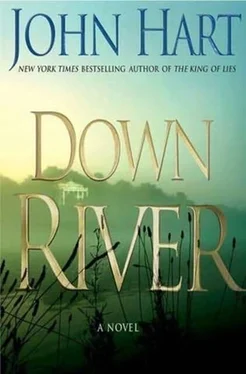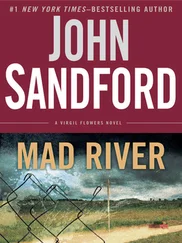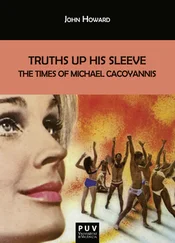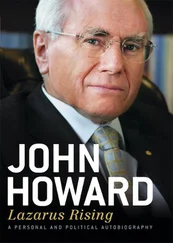“What does that mean?” I asked.
She leaned down to read the name on the deed. “It means that Adolfus Shepherd didn’t buy this land.” I opened my mouth to ask the question, but she forestalled me with an upraised hand and a puff of cigarette breath. She leaned into the deed again, plucked off another name.
“Jacob Chase gave it to him.”
Outside, the heat tried to weigh me down. I looked up the street to the next block, where the courthouse sat, timeless and spare under the white sun. I wanted to talk to Rathburn. He’d been at the farm, trying to speak to my father about something. And there was something about Dolf, too. What was it that my father had said? I stopped on the sidewalk, tilted my head as if to better hear the words: And don’t you go talking to Dolf about this either. What I say goes for him, too.
Something to that effect.
I pushed my feet up the sidewalk, toward the jail. It rose, hard-edged and graceless, with windows as narrow as a woman’s face. I thought of Dolf, rotting inside, then was past, and moving up the courthouse stairs. The judge’s chambers were on the second floor. I had no appointment, and the bailiffs at security knew damn well who I was. They sent me through the metal detector three times, patted me down so well that I could not have slipped a paper clip past them if I’d put it in my underpants. I took it, like I could take it all day. Still, they hesitated; but the courthouse was public domain. They lacked the authority to keep me out.
The judge’s chamber was a different story. It was easy to find-up the stairs, past the D.A.’s office-but getting in was another matter. Nothing public about chambers. You got in if the judge wanted you in. The door was made of steel and bulletproof glass. Two dozen armed bailiffs guarded the building, and any one of them would take me down if the judge told him to.
I looked up and down the empty hall. Beyond the glass, a small woman sat behind a desk. She had a tea-colored face, yellow hair, and severe eyes. When I rang the buzzer she stopped typing. The eyes focused, she lifted a finger, then left the room as fast as her swollen legs could shift her.
Gone to tell the judge who’d come calling.
Rathburn had on a different suit, but looked about the same. A little less sweat, maybe. He studied me through the glass, and I could see the wheels turn. After a few seconds, he whispered to his secretary, who put her fingers on the phone. Then he opened the door. “What do you want?”
“A minute of your time.”
“On what subject?” His glasses flashed, and he swallowed. No matter the verdict, he thought I was a killer. He stepped forward until his body filled the crack in the door. “Are we going to have a problem?”
“Why did you come to see my father the other day? That’s what I’m here to talk about.”
“You can have one minute,” he said.
I followed him past the small woman with the hard eyes and stood in front of his desk as he closed the door down to a crack. “She’s looking for an excuse to call the bailiffs,” he told me. “Don’t give her one.”
He sat and I sat. A light sweat appeared on his top lip. “What was the argument about?” I asked. “You and my father.”
He leaned back and scratched at his toupee with a finger. “Let’s get one thing straight first. The law is the law and the past is past. You’re in my chambers and I’m the judge. I don’t do personal in chambers. You step over that line and I’ll have the bailiffs in here so fast you won’t believe it.”
“You locked me up for murder. You locked Dolf up for murder. Hard to keep that from being personal.”
“Then you can leave right now. I don’t owe you anything.”
I tried to calm down. I told myself that I came here for a reason.
The judge’s face had gone dark red. A chair creaked in the other room. I leaned back, breathed in, breathed out, and he smiled in a way that made me queasy. “That’s good,” he said. “That’s better. I knew that somewhere there was a Chase that could be reasonable.” He smoothed his polished, white hands across the desk. “If you could just talk your father into being equally reasonable.”
“You want him to sell?”
“I want him to consider the well-being of this county.”
“That’s why you went to see him?”
He leaned forward and cupped his hands as if he were holding some great jewel. “There is opportunity here. Opportunity for you, for me. If you could just talk to him…”
“He knows his own mind.”
“But you are his son. He’ll listen to you.”
“That’s why you agreed to see me? So I could talk to my father?”
His face closed down, smile gone. “Somebody needs to make him see reason.”
“Reason,” I said.
“That’s right.” He tried another smile, but it failed. “Things have gone from bad to worse for your family. Seems to me that this is the perfect opportunity to steer your family in a better direction. Make some money. Help the community…”
But I didn’t hear all that. My mind was stuck. “Bad to worse…” I repeated the phrase.
“Yes.”
“What do you mean?”
He opened his hands, lifted the right one, palm up. “Bad,” he said, then lifted the left hand. “Worse.”
I pointed at the right hand, knew that he could read the tight anger in my voice. Knew that he enjoyed it. “Start with the bad,” I said.
“I’ll start with the worse.” He jiggled that hand. “Another loved one in jail for murder. People getting killed and hurt on the property. An angry town-”
“Not everybody feels that way,” I interrupted.
He tilted his head, continued in a louder voice. “Risky business decisions.”
“What risky business decisions?”
His mouth twitched at one corner. “Your father’s in debt. I’m not sure that he can pay.”
“I don’t believe it.”
“It’s a small town, Adam. I know a lot of people.”
“And the bad?” I asked.
He lowered his hands, took on a pained expression that I knew was false. “Do I really need to explain it?”
I bit down, hard.
“Your mother was a beautiful woman…”
He was twisting the knife for his own satisfaction. I saw that and refused to participate. I came to my feet, raised a finger, then turned and walked away. He followed me into the antechamber. I felt him behind me as I passed his secretary’s desk. “Bad to worse,” he said, and I turned to face him. I don’t know what his secretary saw on my face, but she was dialing as I closed the door behind me.
My father was drunk. He was alone in the house and he was hammered. It took about three seconds for me to figure that out, mainly because I’d never seen it before. His religion was work to excess and all other things in moderation, so that in the past, when I’d come home drunk and bloody, his disappointment shone out like holy fire. This thing that I saw now… it was new and it was ugly. His face was loose and drawn, eyes gone wet. He filled the chair like he’d been poured into it. The bottle was open and close to empty, the glass down to half a finger. He stared at something in his hand, and strange emotions moved in him so that his features seemed to flow across the bones of his face. Anger, regret, remembered joy. It was all there in staccato bursts, and it made him look like a soul unhinged. I stood in the door for a long time, and I don’t think he blinked once. Were I to close my eyes, I would see the color gray touched with small, cold yellow. An old man in a fractured slice of time. I had no idea what to say to him.
“Kill any dogs this morning?”
He cleared his throat and his eyes came up. He opened the desk’s drawer and slipped whatever he’d been holding inside. Then he closed the drawer with something like care and shook his head. “Let me tell you something about scavengers, son. Only a matter of time before they find a streak of bold.”
Читать дальше












